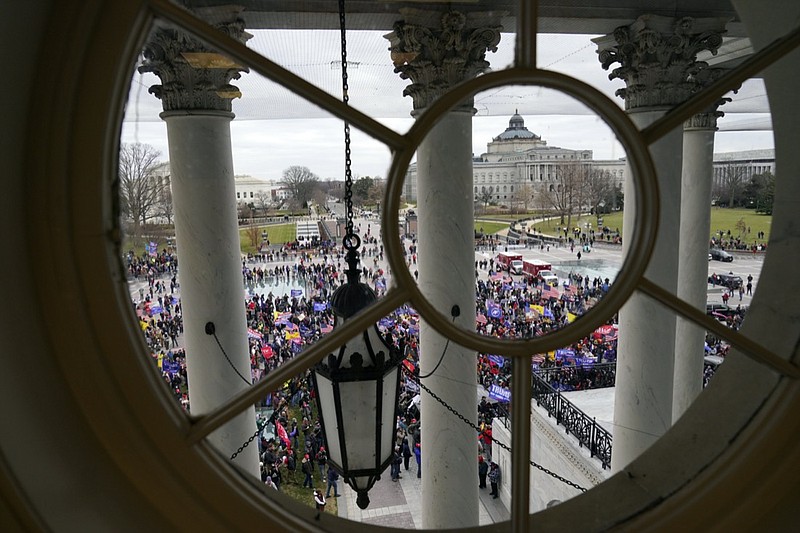Why the wait?
For three hours and 19 minutes, while Pentagon generals sat on their hands as frantic pleas came to them to let the D.C. National Guard confront the mob in the Capitol on Jan. 6, the Trump-incited rioters smashed up the building. People died. Police were beaten. Lawmakers hid for their lives. Americans watched in horror.
It didn't have to be that way. And it was unusual. Quite unusual.
"At 1:49 p.m., I received a frantic call from then-chief of United States Capitol Police, Steven Sund, where he informed me that the security perimeter of the United States Capitol had been breached by hostile rioters," Maj. Gen. William J. Walker, commander of the D.C. Guard, testified Wednesday to a joint Senate committee investigating the attack.
"Chief Sund, his voice cracking with emotion, indicated that there was a dire emergency at the Capitol, and he requested the immediate assistance of as many available national guardsmen that I could muster," Walker continued.
Walker immediately alerted senior Army leadership. Then he had to wait. And wait. And wait. He waited until 5:08 p.m. before Army leadership gave him the needed permission to move.
And who was that Army leadership? Christopher Miller, a White House aide before Donald Trump named him acting defense secretary in November - about the same time Trump began his effort to overturn his election defeat.
Miller, two days before, on Jan. 4, and in light of an intelligence warning about a possible mob, had sent Walker a memo saying that without his "personal authorization," the D.C. Guard could not "be issued weapons, ammunition, bayonets, batons or ballistic protection equipment such as helmets and body armor."
Not even helmets and body armor.
The next day in another memo, the Army secretary said he would "withhold authority" for the guard to deploy a "quick reaction force" and would "require a concept of operation" before allowing such a force to react.
These were "unusual" requirements, Walker testified. These were, for instance, requirements that were never mentioned - let alone written - last summer for the Guard deployments during racial justice protests.
But when police chiefs at the Capitol "pleaded" for the Guard's release on Jan. 6, senior Army officials on the phone said it wouldn't be "a good optic." They thought it would "incite" the crowd - an already incited crowd that was smashing into and throughout the Capitol on live TV.
As much of this attempted coup unfolded, the defense secretary and the Army secretary were "not available," Walker testified.
But one who was available in these conversations was Lt. Gen. Charles Flynn, brother of Michael Flynn - the same convicted and pardoned Mike Flynn who days before had suggested Trump declare martial law and who helped whip the mob into a frenzy the day before the attack. The Pentagon later would deny that Charles Flynn was part of the conversation, but since has acknowledged the fact.
Why the wait? Why the lie? It's not hard to figure out.
The GOP fears your vote.
H.R. 1 is a House of Representatives voting, elections and ethics bill that passed Wednesday with a noble purpose: making it easier for Americans to vote. But judging from Republicans' squawking, you'd think it calls for tearing down our republic.
Mike Pence, for instance, has called it "unconstitutional, reckless and anti-democratic. Kentucky Rep. Garland Barr says it is "the most divisive unconstitutional and destructive piece of legislation of my time in Congress. It would effectively make it legal to cheat."
Hardly.
What the bill would do is fight Republican efforts in states across the country to restrict ballot access and overhaul campaign finance to give small donors rather than large donors more influence. It also would overhaul the redistricting laws that currently allow gerrymandering.
Conservatives claim it would "mandate" early voting, no-excuse absentee voting, provisional ballots for people who accidentally vote out-of-precinct, same-day voter registration and automatic voter registration.
Don't be fooled. There is nothing scary or even unusual about these reforms, which many states have embraced already. And all without seeing the GOP's falsely claimed and falsely predicted pervasive fraud.
What this bill would provide is a set of national standards for voter registration and mail-in voting.
For their part, Republicans in states across the country have proposed a wide range of measures to restrict voting. Measures like curtailing eligibility to vote by mail, prohibiting the use of ballot drop boxes, and blocking early voting on Sundays.
In an effort to get rid of gerrymandering, H.R. 1, titled the "For the People Act," would require each state to use independent commissions (not made up of lawmakers) to approve newly drawn congressional districts. The commissions would each include five Democrats, five Republicans and five independents, requiring bipartisan approval for districts to be allowed.
That's good government.
In campaign finance, H.R. 1 would require super PACS and "dark money" groups to disclose their donors publicly. What a concept.
And it would establish a public funding match for small-dollar donations, financed by a fee on corporations and banks paying civil or criminal penalties.
And, oh, yeah, Facebook and Twitter would have to publicly report the source and amount of money spent on political ads. More good government.
There's more. Watch this space.
